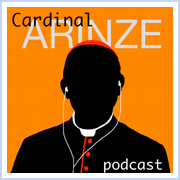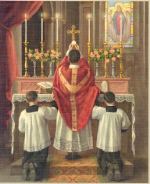While reading the bulletin of St. Cronan's for the Fourth Sunday of Lent, March 21, I came across this interesting article on page 2.The Holy Families Committee of St. Cronan’s was formed in response to the Vatican’s position toward gays and lesbians in the Catholic church. The Holy Families Committee, in conjunction with Catholic Action Network (CAN), is sponsoring an Issues and Inspiration presentation on Saturday, April 3rd at Adams School (1311 Tower Grove Ave.) from 9:00—11:00 a.m. The presentation will focus on the Vatican document, “Considerations Regarding Proposal to Give Legal Recognition to Unions Between Homosexual Persons”. Please feel free to invite anyone who is interested in discussing this document and our response to it. Childcare will NOT be provided. We look forward to seeing you there.
One wonders just how the teaching of the Church will be maligned and distorted and rejected at this 'presentation'?
Why would I say such a thing? Take a look at the Catholic Action Network website and you will notice that on Wednesday, March 24, they are having a "Global" Day of Prayer for Women's Ordination with a candlelight vigil at the Cathedral Basilica at 6:00pm. Surely this St. Louis based unCatholic group can rouse a "global" response for women's ordination which is contrary to the infallible teaching of the Church.
I'm wondering how many of those who attended the recent VOTF conference will be at these meetings?
They have also included
additional information on Archbishop Burke, presumably as a condemnation of his other works and efforts in promoting authentic Catholic doctrine when they conclude by saying "Well, that should give you the gist of things."
Here is what they posted about our wonderful Archbishop:
Raymond L. Burke:The spiritual moderator of the United States Association of Consecrated Virgins.
He is involved with the Call to Holiness conference with Mitch Pacwa and Cardinal Lopez Trujillo.
He has publicly opposed the withdrawal of hydration and nutrition in the Schiavo case in Florida, saying *"It is never permissible to remove food and water to cause death"
*He is the national director of the Marian Catechist association, founded by John Hardon, SJ. "The Marian Catechist Apostolate helps you develop a spiritual life that prepares you for your consecration to the Sacred Heart of Jesus, while at the same time, it helps to prepare you, doctrinally, to pass on this tremendous gift of the Faith, with confidence, through the home-study courses." "Do whatever He tells you"! (Marian Catechist motto) from the Marian Catechist web page:http://www.mariancatechist.com
He has given talks to the Wanderer Forum Foundation and has been sponsored by Catholics United for the Faith (Milwaukee, December 6-7, 2002). See also http://www.thewandererpress.com/a8-01-02.htm
He is on the advisory board of the Cardinal Newman Society, along with Bishop Bruskewitz of Lincoln, Bishop Doran of Rockford, Archbishop Donoghue of Atlanta, and Archbishop Meyers
of Newark. The mission of the Cardinal Newman Society is to promote Catholic identity in higher education, especially through the implementation of /Ex Corde Ecclesiae/ (http://www.cardinalnewmansociety.org/about_us1.htm)
He has addressed the national convention of Catholics United for the Faith in their "Church Teaches Forum", along with " His Eminence Francis Cardinal Arinze, His Eminence Edouard Cardinal
Gagnon, Bishop Thomas Doran, Bishop Raymond Burke, and Fr. Edmund McCaffrey(http://www.cuf.org/cufevents.htm)"
According to the National Catholic Register, Bishop Burke was one of the eight signers of a letter calling for a plenary council to address the clergy sex-abuse scandal : "The bishops' letter says the plenary council would center on the teaching of the Second Vatican Council and post-conciliar Magisterium on the life of bishops and priests, on sexual morality in general and on celibate chastity as an authentic form of human sexuality. It also would affirm the means by which the Church has told pastors they can live a virtuous life, including daily celebration of Mass, frequent confession and obedient submission to Church teaching. (http://www.ncregister.com/Register_News/082202ple.htm)
Well, that should give you the gist of things.
http://www.calltoholiness.com/photo/bishop_burke.htm
It's no wonder they are upset! Archbishop Burke is not a moral relativist. He is not a dissenter of Catholic faith and morals. He is not someone who would support their agenda of destroying the Church. How sad! How pitiably sad for them! We can pray our prayers of thanksgiving that our Lord has seen fit to bless us with a shepherd and spiritual father like Archbishop Burke who proclaims the truth of Christ to us in union with the Holy Father. We have so much for which to be thankful!









